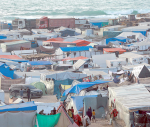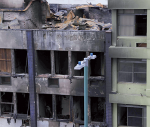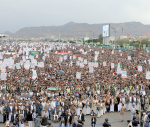You are here
Jordan confronts terrorism again
Jun 07,2016 - Last updated at Jun 07,2016
The terrorist attack that targeted the General Intelligence Department (GID) office near Baqaa refugee camp, north of Amman, on the morning of the first day of Ramadan has shocked Jordanians who for years believed that their country was safe relative to what is happening in Syria and Iraq.
The attack claimed the lives of three officers and two workers, and was a grim reminder that the open war on terror was far from over and that the country is susceptible to atrocities carried out by either active members of terrorist groups like Daesh or lone wolves sympathetic to their ideology.
The GID is a symbolic target for terrorists. The department, which has been in the forefront in the fight against radical Islamist groups for decades, is celebrated for its professionalism and vigilance. It has a successful record in preempting terrorist attacks against civilian and sensitive targets in the Kingdom.
In March, GID was able to track and destroy a pro-Daesh terror cell in the northern city of Irbid. Investigation into the Baqaa attack may reveal a connection to the Irbid operation.
The perpetrator of Monday’s attack was arrested. If there are others, it is only a matter of time before the GID identifies them and hunts them down.
Meanwhile, the attack is an eye opener for many who see Jordan as becoming a primary target for radical jihadists.
It is no secret that certain parts of the Kingdom have acted as incubators to salafist jihadist groups. One of these is the Baqaa refugee camp, an often marginalised and heavily populated area with high unemployment rates.
Salafist jihadist groups put focused on such areas to spread their ideas and recruit disenfranchised youth.
Baqaa is the ideal microcosm for jihadist recruiters and it is one of many such areas around the Kingdom.
It is most likely that the perpetrator of Monday’s attack is no foreign fighter, but local sympathiser of radical Islamist groups.
If this turns out to be the case, then it will be another stark reminder that while successful on the security front, Jordan’s authorities must also focus on the contribution a stagnant economy, high unemployment and growing poverty pockets makes to the rise of radical religious ideas and beliefs.
Much has been written and said about this, but little has been done at government level.
This week’s attack also points to the fact that the danger for Jordan is unlikely to come from across the long borders with Iraq and Syria, but rather from local sleeper cells and lone wolves.
Jordan’s armed forces are the best in the region and have been successful in preventing unlawful crossing of the border. They are not taking any chances and they deal effectively with attempts to compromise Jordan’s national security by jihadists and others.
It is no secret that hundreds of Jordanians have joined the ranks of Al Qaeda proxy in Syria, Al Nusra Front, and Daesh. Many tried to come back and those who were able to were captured and are standing trial.
Sympathisers and those who use social media to promote radical ideas are monitored and often arrested for breaking the law. But the fight against radicalism must go beyond that.
The government will have to review the stimulators that trigger the spread of radical ideas. This should include a thorough review of school curricula, as well as strict management of mosques and religious institutions.
This fringe and obtuse brand of political Islam must be nipped in the bud and it is time to recognise that unjust socio-economic conditions contribute to creating an environment that welcomes this bizarre ideology.
In the aftermath of the so-called Arab Spring, Jordanians opted for security and safety as they watched in horror the unfolding developments that ravaged Libya, Syria, Egypt and Iraq. The political system was able to maintain its vibrancy with the state’s institution functioning normally.
Despite the heightened state of vigilance at the security level, Jordanians were able to carry out their daily lives with no interruptions.
In addition, the state continued to embrace a programme that called for political, economic and social reforms, respect for free expression and individual liberties.
Some critics will argue that this programme cannot function as the state wages war on radical groups. But the majority of Jordanians believe that the two are interconnected and that one must not be sacrificed for another.
This determination will become more visible as the country gets ready to elect a new legislature under an amended Elections Law that seeks to overhaul the political landscape and trigger wider popular participation.
Moreover, the new government has reiterated the need to fight unemployment and improve the economic lot of citizens. This is an important factor that will go a long way to achieve victory against radical groups.
The writer is a journalist and political commentator based in Amman.













